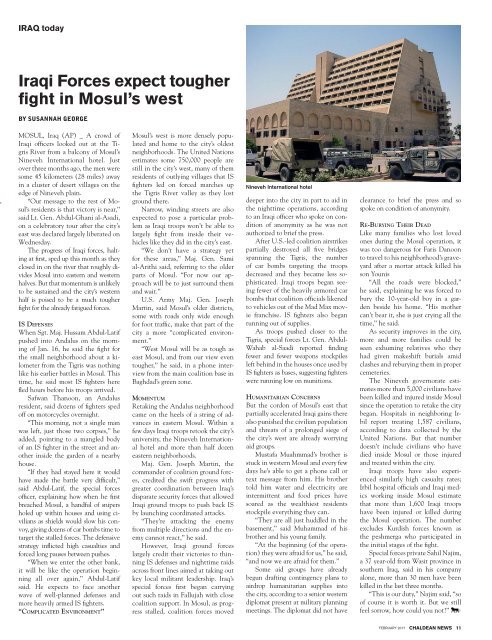Create successful ePaper yourself
Turn your PDF publications into a flip-book with our unique Google optimized e-Paper software.
IRAQ today<br />
Iraqi Forces expect tougher<br />
fight in Mosul’s west<br />
BY SUSANNAH GEORGE<br />
MOSUL, Iraq (AP) _ A crowd of<br />
Iraqi officers looked out at the Tigris<br />
River from a balcony of Mosul’s<br />
Nineveh International hotel. Just<br />
over three months ago, the men were<br />
some 45 kilometers (28 miles) away<br />
in a cluster of desert villages on the<br />
edge of Nineveh plain.<br />
“Our message to the rest of Mosul’s<br />
residents is that victory is near,’’<br />
said Lt. Gen. Abdul-Ghani al-Asadi,<br />
on a celebratory tour after the city’s<br />
east was declared largely liberated on<br />
Wednesday.<br />
The progress of Iraqi forces, halting<br />
at first, sped up this month as they<br />
closed in on the river that roughly divides<br />
Mosul into eastern and western<br />
halves. But that momentum is unlikely<br />
to be sustained and the city’s western<br />
half is poised to be a much tougher<br />
fight for the already fatigued forces.<br />
IS Defenses<br />
When Sgt. Maj. Hussam Abdul-Latif<br />
pushed into Andalus on the morning<br />
of Jan. 16, he said the fight for<br />
the small neighborhood about a kilometer<br />
from the Tigris was nothing<br />
like his earlier battles in Mosul. This<br />
time, he said most IS fighters here<br />
fled hours before his troops arrived.<br />
Safwan Thanoon, an Andalus<br />
resident, said dozens of fighters sped<br />
off on motorcycles overnight.<br />
“This morning, not a single man<br />
was left, just those two corpses,’’ he<br />
added, pointing to a mangled body<br />
of an IS fighter in the street and another<br />
inside the garden of a nearby<br />
house.<br />
“If they had stayed here it would<br />
have made the battle very difficult,’’<br />
said Abdul-Latif, the special forces<br />
officer, explaining how when he first<br />
breached Mosul, a handful of snipers<br />
holed up within houses and using civilians<br />
as shields would slow his convoy,<br />
giving dozens of car bombs time to<br />
target the stalled forces. The defensive<br />
strategy inflicted high casualties and<br />
forced long pauses between pushes.<br />
“When we enter the other bank,<br />
it will be like the operation beginning<br />
all over again,’’ Abdul-Latif<br />
said. He expects to face another<br />
wave of well-planned defenses and<br />
more heavily armed IS fighters.<br />
“Complicated Environment’’<br />
Mosul’s west is more densely populated<br />
and home to the city’s oldest<br />
neighborhoods. The United Nations<br />
estimates some 750,000 people are<br />
still in the city’s west, many of them<br />
residents of outlying villages that IS<br />
fighters led on forced marches up<br />
the Tigris River valley as they lost<br />
ground there.<br />
Narrow, winding streets are also<br />
expected to pose a particular problem<br />
as Iraqi troops won’t be able to<br />
largely fight from inside their vehicles<br />
like they did in the city’s east.<br />
“We don’t have a strategy yet<br />
for these areas,’’ Maj. Gen. Sami<br />
al-Arithi said, referring to the older<br />
parts of Mosul. “For now our approach<br />
will be to just surround them<br />
and wait.’’<br />
U.S. Army Maj. Gen. Joseph<br />
Martin, said Mosul’s older districts,<br />
some with roads only wide enough<br />
for foot traffic, make that part of the<br />
city a more “complicated environment.’’<br />
“West Mosul will be as tough as<br />
east Mosul, and from our view even<br />
tougher,’’ he said, in a phone interview<br />
from the main coalition base in<br />
Baghdad’s green zone.<br />
Momentum<br />
Retaking the Andalus neighborhood<br />
came on the heels of a string of advances<br />
in eastern Mosul. Within a<br />
few days Iraqi troops retook the city’s<br />
university, the Nineveh International<br />
hotel and more than half dozen<br />
eastern neighborhoods.<br />
Maj. Gen. Joseph Martin, the<br />
commander of coalition ground forces,<br />
credited the swift progress with<br />
greater coordination between Iraq’s<br />
disparate security forces that allowed<br />
Iraqi ground troops to push back IS<br />
by launching coordinated attacks.<br />
“They’re attacking the enemy<br />
from multiple directions and the enemy<br />
cannot react,’’ he said.<br />
However, Iraqi ground forces<br />
largely credit their victories to thinning<br />
IS defenses and nighttime raids<br />
across front lines aimed at taking out<br />
key local militant leadership. Iraq’s<br />
special forces first began carrying<br />
out such raids in Fallujah with close<br />
coalition support. In Mosul, as progress<br />
stalled, coalition forces moved<br />
Nineveh International hotel<br />
deeper into the city in part to aid in<br />
the nighttime operations, according<br />
to an Iraqi officer who spoke on condition<br />
of anonymity as he was not<br />
authorized to brief the press.<br />
After U.S.-led coalition airstrikes<br />
partially destroyed all five bridges<br />
spanning the Tigris, the number<br />
of car bombs targeting the troops<br />
decreased and they became less sophisticated.<br />
Iraqi troops began seeing<br />
fewer of the heavily armored car<br />
bombs that coalition officials likened<br />
to vehicles out of the Mad Max movie<br />
franchise. IS fighters also began<br />
running out of supplies.<br />
As troops pushed closer to the<br />
Tigris, special forces Lt. Gen. Abdul-<br />
Wahab al-Saadi reported finding<br />
fewer and fewer weapons stockpiles<br />
left behind in the houses once used by<br />
IS fighters as bases, suggesting fighters<br />
were running low on munitions.<br />
Humanitarian Concerns<br />
But the cordon of Mosul’s east that<br />
partially accelerated Iraqi gains there<br />
also punished the civilian population<br />
and threats of a prolonged siege of<br />
the city’s west are already worrying<br />
aid groups.<br />
Mustafa Muahmmad’s brother is<br />
stuck in western Mosul and every few<br />
days he’s able to get a phone call or<br />
text message from him. His brother<br />
told him water and electricity are<br />
intermittent and food prices have<br />
soared as the wealthiest residents<br />
stockpile everything they can.<br />
“They are all just huddled in the<br />
basement,’’ said Muhammad of his<br />
brother and his young family.<br />
“At the beginning (of the operation)<br />
they were afraid for us,’’ he said,<br />
“and now we are afraid for them.’’<br />
Some aid groups have already<br />
begun drafting contingency plans to<br />
airdrop humanitarian supplies into<br />
the city, according to a senior western<br />
diplomat present at military planning<br />
meetings. The diplomat did not have<br />
clearance to brief the press and so<br />
spoke on condition of anonymity.<br />
Re-Burying Their Dead<br />
Like many families who lost loved<br />
ones during the Mosul operation, it<br />
was too dangerous for Faris Danoon<br />
to travel to his neighborhood’s graveyard<br />
after a mortar attack killed his<br />
son Younis<br />
“All the roads were blocked,’’<br />
he said, explaining he was forced to<br />
bury the 10-year-old boy in a garden<br />
beside his home. “His mother<br />
can’t bear it, she is just crying all the<br />
time,’’ he said.<br />
As security improves in the city,<br />
more and more families could be<br />
seen exhuming relatives who they<br />
had given makeshift burials amid<br />
clashes and reburying them in proper<br />
cemeteries.<br />
The Nineveh governorate estimates<br />
more than 5,000 civilians have<br />
been killed and injured inside Mosul<br />
since the operation to retake the city<br />
began. Hospitals in neighboring Irbil<br />
report treating 1,587 civilians,<br />
according to data collected by the<br />
United Nations. But that number<br />
doesn’t include civilians who have<br />
died inside Mosul or those injured<br />
and treated within the city.<br />
Iraqi troops have also experienced<br />
similarly high casualty rates;<br />
Irbil hospital officials and Iraqi medics<br />
working inside Mosul estimate<br />
that more than 1,600 Iraqi troops<br />
have been injured or killed during<br />
the Mosul operation. The number<br />
excludes Kurdish forces known as<br />
the peshmerga who participated in<br />
the initial stages of the fight.<br />
Special forces private Sahil Najim,<br />
a 37 year-old from Wasit province in<br />
southern Iraq, said in his company<br />
alone, more than 30 men have been<br />
killed in the last three months.<br />
“This is our duty,’’ Najim said, “so<br />
of course it is worth it. But we still<br />
feel sorrow, how could you not?’’<br />
<strong>FEBRUARY</strong> <strong>2017</strong> CHALDEAN NEWS 11

















